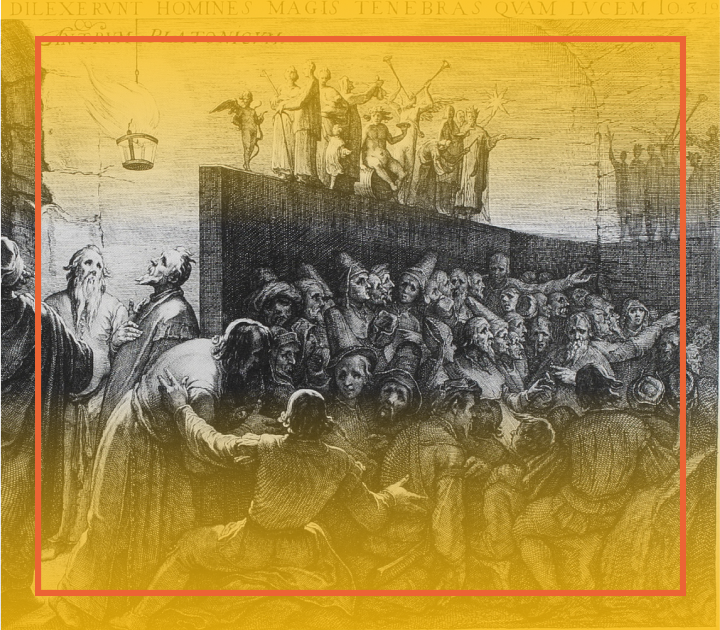
The relationship between the Programmer and the Program is one not often considered through the lens of metaphysics and ethics. As established in the previous piece, the Programmer is burdened by a responsibility to embrace and submit to the greater Truth or λόγος (Logos) in their work. Plutarch, a Platonist, described the λόγος as the “go-between” between God and humanity and we will consider what that metaphysical hyper-space may contain by investigating the metaphysics of Plato. Following this, we can derive guidance for the Programmer and their application of this divine knowledge by considering Platonic ethics. Some specific Gnostic traditions of a supernatural creative force will provide a counter to the idealism and standards set by Plato for a ruler and craftsman. Ultimately, we venture to answer the question – what comments would Plato leave on my pull request?
Plato and Forms
The safest general characterization of the European philosophical tradition is that it consists of a series of footnotes to Plato[1]
Plato (427 – 348 BC) was a central figure in the ancient Greek philosophical tradition and laid the groundwork for much of modern philosophy. One of Plato’s most popular works, The Republic, uses dialogue and allegories to consider, among many others, questions of epistemology and metaphysics.
One of the more foundational problems addressed in the dialogue is to define Goodness (ἀγαθόν). Plato uses the analogy of the Sun, defining the Sun as “the child of goodness” (“ἔκγονός τε τοῦ ἀγαθοῦ”)[2]. The Sun is not Goodness itself but allows us to see the Goodness – just as our cosmic sun is not sight itself but gives us sight.
This analogy is later expanded in one of his most well-known excerpts, the Allegory of the Cave. In short (see here for a full explanation), this allegory depicts prisoners who are physically restrained in a dark cave and only able to perceive the shadows of objects manipulated by people behind them in front of a fire. Because of their restricted experience, the prisoners believe the shadows to be reality.
Any prisoner who attempted to escape would be blinded by the light of the fire and would in fear and pain return back to the comfortable presence of familiar shadows. But, the allegory continues, if a prisoner was forcefully dragged out of the Cave they would suffer from the brightness of the Sun for some time before acclimating to the light and observing the real and natural things in the world.
These things are, in Plato’s metaphysics, the Forms (rendered singularly in the Greek εἶδος, or Idea, ἰδέα) – the real, eternal and absolute Essence (ousia, οὐσία) of things. The material objects in our human world – and in the allegory the objects manipulated in front of the fire – are mere imitations of the Forms. A material chair is not itself a chair but only contains Essences of Chairness. The Form of a chair, Chairness, is for Plato the real and absolute Chair.
For the final step of the allegory, once fully acclimated to the light and having observed the real things of the world, the prisoner could view directly the Sun itself – or, now the reader escaping the allegory, Goodness and Truth. Plato believed that through considering and acquiring knowledge of the Forms a philosopher could ultimately attain knowledge of the Form of the Good (τὸ αὐτὸ ἀγαθόν ἰδέα) itself.
Plato makes a significant distinction between the physical reality of our human existence and the realm in which the Forms exist. In the sensible world we experience the shadows of Forms with our senses while the Forms and the Form of Good itself exist in the intelligible realm. To describe the intelligible realm Plato used the concept of the hyperuranion (ὑπερουράνιον τόπον) or a “place beyond heaven”.
Forms and the Programmer
All the long, bad examples in the [OOP] textbooks could be compressed into a paragraph, if every programmer read Plato.[3]
The most apparent mapping from Plato to Programmer is from Forms and shadows/objects to OOP classes and instances. While a class represents to the Programmer the Form of Chairness, the instances of Chair are “qualified and conditioned”[4] objects, beholden to the ever-changing nature of the relationships within the system.
Given the abstract nature of Forms, we cannot fully define with language, images or any other human-producible content the true Form of a particular thing. But we strive for the Essences of any given thing when we produce a definition of it. For example, we cannot draw a perfect circle but we can take steps to approach the definition of one – along the way encountering hurdles like the irrationality of pi. Therefore, the Programmer is not tasked with nor is capable of truly or fully defining the Form of Chairness but does strive for the Chair class to embody those hyperuranion Essences.
An additional meta-application of the ideology is discussed by a user on WikiWikiWeb (the first ever wiki; created in 1995) who considers that a program itself may have a “true and real correct solution”[5] that exists and the implementations we write are mere shadows or imitations of that True solution.
The relationship of the Programmer to the Program is necessarily sophocratic – to ascend out of the Cave and, guided by the light of the Sun, towards not only the Truth of the entities within the implementation but towards the Truth of the implementation itself. “The ideal of ‘formness’ is, for Plato, the universe’s ordering principle”[6] and classes the ordering principle of a Program – through which the Forms and Form of the Good flow into the Program.
Plato and the City-State
Until philosophers are kings, or the kings and princes of this world have the spirit and power of philosophy, … cities will never have rest from their evils,—nor the human race, as I believe,—and then only will this our State have a possibility of life and behold the light of day.[7]
Onesicritus, writer and philosopher, described Alexander the Great as a “philosopher in arms”. Alexander was a student of Aristotle (who was a student of Plato) and ruled over the kingdom of Macedon during the 4th century BC. He is one of several historical examples of what Plato considered the Philosopher King – a ruler who commands over a city-state with philosophical knowledge.
Plato provided a strict definition of his ideal ruler – one who is a true philosopher is a lover of not just things but “the truth in each thing”[8]. In other words, a ruler who doesn’t revel in the physical and material but in the intelligible realm of Forms and Goodness. This superphysical realm provides the divine knowledge for the Philosopher King to establish “the laws respecting the fine, the just, and the good, if there is need to establish them, or take care to preserve those that are established”[9].
Providing some nuance, Plato does recognize this ideal is far from reality and that most philosophers are “utter rogues” and generally considered useless and corrupt. This corruption and rejection of divine Truth he blames on a corrupt society which has no inherent desire to seek knowledge.

The Program as City-State
[If] political knowledge is like architecture, it is a commanding knowledge (ἐπιτακτική ἐπιστήμη); it gives commands. If we search for the source of these commands, a likely source is the relations and distinctions to be found among Forms.[10]
The ancient Greek τέχνη or techne (prefix of the modern “technology”) was considered by Plato to represent a craft and specifically the craftsman seeking the welfare of the object of their craft. For example, a shipbuilder seeks the welfare of a ship as a physician does a body. Plato extended this idea of craftsmanship to the Philosopher King and the welfare of the city-state. For the health and well-being of the city-state the sophocratic ruler must “look to the truest paradigm, always referring to it and contemplating it as accurately as possible”[9].
We will extend this idea to the Programmer and the Program. The Programmer, a craftsman, with knowledge sourced from the hyperuranion contemplates and commands the Program. Just as a woodworker begins with an idle pile of wood, the Programmer must contend with a “disinterested” machine “stuck in a meaningless now”[11]. Both woodworker and Programmer may by contemplating Chairness manifest physically an instance of a Chair. Therefore, both craftsmen are responsible for the existence of the Chair, its relationships to other things and maintaining its Chairness throughout its existence.
The Demiurge
He may also be the practical expression of the reason of God, the Logos as operative in the harmony of the universe.[12]
The Greek δημιουργός (demiurge) was originally a common noun meaning “craftsman”, Plato in his Timaeus declared the Demiurge the craftsman or creator of the universe. Driven by his knowledge of the Forms to fashion imitations, Plato’s Demiurge wished Good on his creation.
In later Gnostic traditions, more mythology, philosophy and themes were woven into the story of the Demiurge. Some Gnostic texts used different names for the Demiurge including the Hebrew Samael (סמאל), “Blind God” or “God of the Blind”. This title is particularly fitting considering the etymology of the Greek εἶδος (Form) is the Proto-Indo-European *weyd- (“to see”).
The Apocryphon of John describes the Demiurge as “impious in his arrogance” and “ignorant of his strength, the place from which he had come”[13]. In another passage, the Demiurge is filled with envy when he observes a ray of light from above enter the body of man and give him a soul.
While Plato’s Demiurge was guided by Goodness, this Gnostic craftsman rejects Goodness and is therefore considered the originator of Evil or even Evil itself. The Blind God wished even to be the God of the Blind: to deprive humanity of access to the hyperuranion – represented by the ray of light entering the body of man.
The Gnostic Demiurge is the antithesis of Plato’s Philosopher King – not just unaware of the Forms and Goodness but actively and ignorantly rejecting them. The Programmer, as a craftsman of the Program, the “manifestation of their philosophical endeavor into material reality”[14], will hypostatize their reason. Should this be of a corrupt and ignorant nature? Or, armed with sight and knowledge, Forms and Goodness, seeking the welfare and harmony of the Program?
Reject Demiurgicity; Embrace Sophocracy!

References
[1] Whitehead, A. N. (1979). Process and Reality. Free Press.
[2] Pojman, Louis & Vaughn, L. (2011). Classics of Philosophy. New York: Oxford University Press, Inc.
[3] Hardie, P. (n.d.). Software Platonism. Wiki.c2.com. https://wiki.c2.com/?SoftwarePlatonism
[4] Kidder, D. S. and Oppenheim, N. D. (2006), The Intellectual Devotional, p. 27, Borders Group, Inc, Ann Arbor, ISBN 978-1-60961-205-4.
[5] SomeCrackpotDefender (n.d.). Software Platonism. Wiki.c2.com. https://wiki.c2.com/?SoftwarePlatonism
[6] Colli, I. (5AD). Logos: Mind of God. https://ilariocolli.com/articles/logos-mind-of-god
[7] Republic 5.473
[8] Republic 5.480
[9] Republic 5.484
[10] Parry, R. (2003, April 11). Episteme and Techne. Stanford Encyclopedia of Philosophy Archive. https://plato.stanford.edu/archives/win2021/entries/episteme-techne/
[11] Tessone, C. (2023, September). Heidegger’s Bots: The Birth and Death of Responsible Artificial Intelligence. Epoch Magazine. https://epochemagazine.org/65/heideggers-bots-the-birth-and-death-of-responsible-artificial-intelligence/
[12] Arendzen, J. P. (1913). Catholic Encyclopedia (Vol. 4). The Encyclopedia Press.
[13] “Apocryphon of John,” translation by Frederik Wisse in The Nag Hammadi Library. Accessed online at gnosis.org
[14] Curcie, A. (2023, April 25). Embracing Λόγος: Programming as Imitation of the Divine. SimpleThread Blog. https://www.simplethread.com/embracing-programming-as-imitation-of-the-divine/
Loved the article? Hated it? Didn’t even read it?
We’d love to hear from you.



